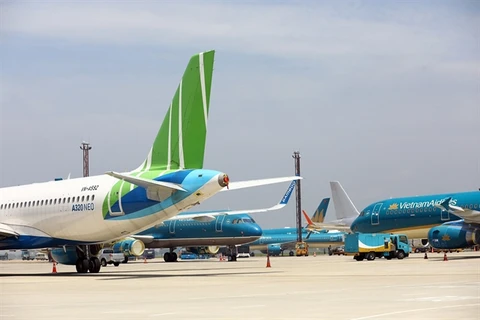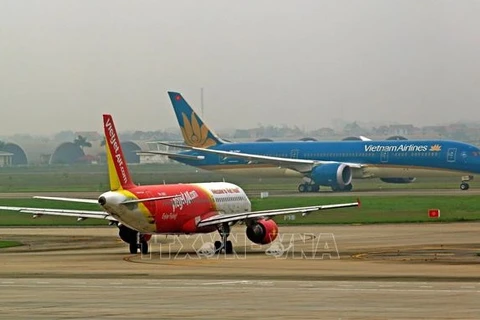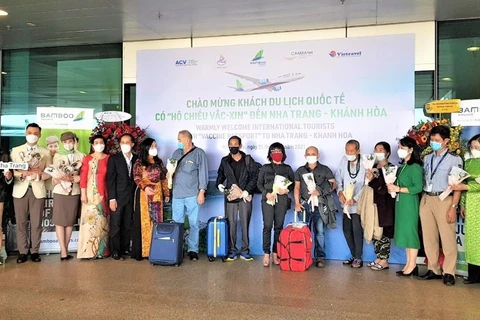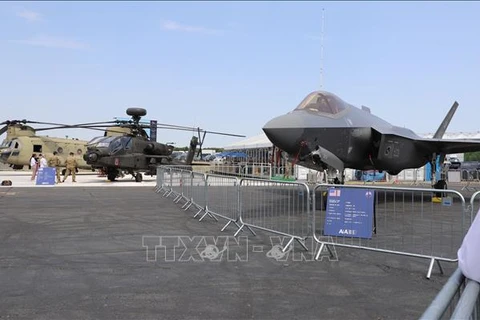 Vietnam’s aviation industry still faces post-pandemic challenges. - Illustrative image (Photo: VietnamPlus)
Vietnam’s aviation industry still faces post-pandemic challenges. - Illustrative image (Photo: VietnamPlus) Hanoi (VNA) - Vietnam’s aviation industry is forecast to continue facing difficulties and challenges in 2022 and needs support policies to be able to strongly rebound.
Due to the impacts of the COVID-19 pandemic, the aviation industry was severely affected in 2020 and 2021 as domestic airlines stopped international flights, which accounted for an average of 60% of their capacity, while the domestic market also suffered a serious decline.
Although the pandemic has been somewhat controlled and socio-economic activities recovered gradually, Vietnam’s aviation industry is still forecast to face difficulties in 2022 as oil prices have strongly increased, global economic growth slowed, and monetary policies been tightened to cope with high inflation.
New challenges
Economic and political instability in the world has caused fuel prices to spike, putting heavy cost pressure on airlines.
According to Le Hong Ha, if the air petrol price stays at 130 USD per barrel for 2022, Vietnam Airlines will have to pay 5.7 trillion VND (nearly 243.58 million USD) more for fuel. If the petrol price is 160 USD per barrel, the additional expenses will increase by 9.1 trillion VND.
Vietnam Airlines fears that the disadvantageous factors will increase the price of Jet A1 above 160 USD per barrel. In the worst-case scenario, the price may hit 200 USD per barrel.
The national flag carrier said with the average fuel price of 130 USD per barrel, the fuel cost/seat for its Airbus321 aircraft is 688,000 VND for the Ho Chi Minh City-Hanoi route; and 450,000 VND for each flight between Ho Chi Minh City/Hanoi and Da Nang.
Deputy head of the Civil Aviation Authority of Vietnam (CAAV) Pham Van Hao said business activities of Vietnamese airlines are predicted to continue facing difficulties.
If the price of jet fuel continues to spike, many airlines will suffer big losses unless they are supported by the State, he stressed.
According to Bui Doan Ne, General Secretary of the Vietnam Aviation Business Association (VABA), the aviation sector will still be affected by the COVID-19 pandemic, the development of the global and domestic economy, the restructuring of aviation enterprises, the aviation industry’s integration level on the global and regional scale, and impacts of the Government’s policies.
Measures to help industry recover from pandemic
Dinh Viet Thang, head of CAAV, stressed that the Government's policies and solutions have contributed to helping the aviation industry cope with the pandemic.
The Government has created the market and development corridor for the aviation industry, focusing on opening tourism activities, loosening pandemic prevention and control regulations, lifting quarantine and testing regulations for arrivals, exempting visas for citizens from 13 countries, and speeding up the issuance of vaccine passports.
Additionally, the Government has also made it easier for airlines to access sustainable capital resources, he said.
CAAV will focus on reviewing and adjusting air transport policies, especially those on flexibly regulating air transport fares to create conditions for airlines to accumulate finance, and regulating international air transport to support Vietnamese airlines in maintaining and restoring their competitiveness in the international market, Thang said.
Besides the efforts of each enterprise in arranging and mobilising financial sources from different channels, CAAV has proposed the Government consider special support packages for aviation businesses.
VABA has also suggested the Government continue to invest in building, expanding and synchronising the aviation industry’s infrastructure system in order to attract more private and public-private investment to aviation infrastructure.
The Government should soon start negotiations with countries that are potential markets for the aviation industry that Vietnam has not yet exploited much, towards making it easier for Vietnamese airlines to penetrate and exploit those markets, Thang added.
In the domestic market, six Vietnamese carriers were operating 55-60 routes connecting Hanoi, Da Nang and HCM City with 19 local airports. The lifting of pandemic-related restrictions, along with booming demand, was bringing about a fast recovery of the domestic aviation transport, with the number of domestic passengers growing from 10-15% each month in the second quarter.
The number of air passengers through Vietnamese airports was expected to reach 70-80 million this year, including 8-10 million international travellers./.























